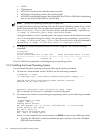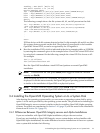• Output from the installation procedure is nearly identical for both Alpha and Integrity
servers except, of course, the operating system names as well as names of products included
with the installation. For example, the OpenVMS Integrity servers windowing and networking
product names are all displayed as HP I64VMS product-name, such as HP I64VMS
KERBEROS, while OpenVMS Alpha product names are displayed in any of three different
ways, depending on the product and version:
— HP product-name, such as HP AXPVMS KERBEROS
— DEC product-name, such as DEC AXPVMS DWMOTIF
— CPQ product-name, such as CPQ AXPVMS CDSA
• The default target system disk and volume labels are unique for each system.
• The OpenVMS Integrity servers procedure does not ask whether your system will be an
instance in an OpenVMS Galaxy; OpenVMS Integrity servers does not support OpenVMS
Galaxy.
• The OpenVMS Alpha operating system includes several components that are not included
with the OpenVMS Integrity servers, such as C Object Libraries and software support for
translating images.
• When installing OpenVMS Integrity servers onto the system disk the first time, you are
advised to set up the system with a boot option for the system disk (and to set it as the
default boot device); you can allow the installation procedure to assist you in setting up and
validating a boot entry. Whereas on Alpha systems you can configure boot devices only by
shutting down the system and entering commands at the console, on Integrity server systems
you can configure boot devices either before you shut down the system (using the installation
procedure or, once OpenVMS is running, using the OpenVMS Integrity servers Boot Manager
utility) or after you shut down the system (using EFI Utilities for OpenVMS or EFI itself).
• For OpenVMS Integrity servers, when you install the operating system by booting from the
distribution media, the PCSI utility uses the following to validate the kits that were signed:
— Prior to Version 8.4 - Secure Delivery component of CDSA
— From Version 8.4 onwards -HPBinarychecker
For OpenVMS Alpha, such validation is not performed when installing the operating system
from the distribution media (CD). (Because of limitations of the OpenVMS Alpha CD boot
environment, CDSA is not present on the distribution CD in usable form.) On both OpenVMS
Alpha and Integrity server systems, signed PCSI kits that you install subsequently (including
signed kits on the distribution media) are validated. In addition, on both OpenVMS Alpha
and OpenVMS Integrity server systems, the DCL command PRODUCT SHOW HISTORY
displays the validation status of installed products and identifies those that were installed
from unsigned kits or were installed prior to the availability of the Secure Delivery
functionality.
3.4.2 Responding to Prompts During Installation
At different points during the installation, you must respond to prompts that ask you to supply
specific information. This manual and the help text available during the installation procedure
tell you how to obtain most of this information and how to make decisions when responding to
specific prompts.
To repeat an explanation provided by the installation procedure, type a question mark (?) at the
prompt. To change or correct a response made to an earlier question, enter the caret (^) character
as many times as needed. Entering this character might take you back more than one question.
To return to the main menu, press Ctrl/Y, which aborts the installation.
HP recommends that you review the following summary before you begin the installation so
that you understand beforehand the types of information you need to provide.
54 Installing the OpenVMS Operating System


















